If you aren’t using AI to augment your academic research in 2023, you are wasting a lot of time – time that you could free up from grunt work and invest in the more interesting stuff.
AI tools have proliferated since the launch of GPT 3 and beyond. The sudden and simultaneous rise of so many consumable AI-powered tools has quickly muddied the waters and made it tiresome if not impossible to get your hands on the right set of AI tools for researchers.
Fear not! I have hand-picked (I’ve had help, a lot of it, to be honest) 10 of the best AI tools for researchers. Go through the list, combine multiple tools, and create a customized stack of AI tools to help with your research process.
Top 10 AI tools for researchers
We’ll discuss tools powered by artificial intelligence that can augment your research work, save you a lot of time through the automation of certain tasks, and help you brainstorm new ideas avoid plagiarism, and streamline the research process.
1. PDFgear Copilot
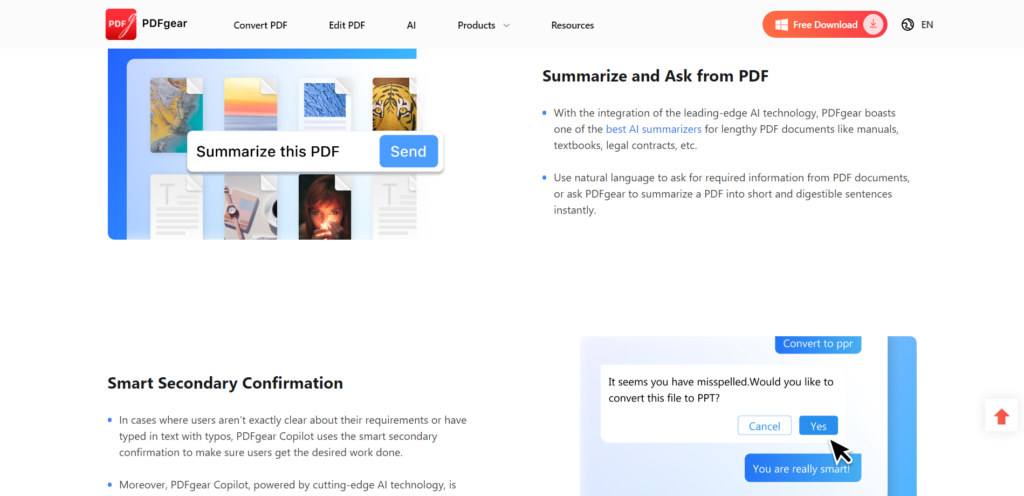
This PDF editor with a humble-looking website doesn’t even market itself properly as a top-class AI tool for researchers. It just is. PDFgear offers you some very simple functionalities that are going to save you a lot of time in different stages of your research activities.
It will let you upload PDF files and give you a summary of what’s inside the PDF. If you think it has missed something, ask. And it will find you the specific piece of information you were worried about. You can even ask PDFgear to compress a file, delete some pages, and perform other small-time edits via chat.
Now, let’s say you have created a paper and you want to check it for errors before submitting it. Run it through PDFgear. The AI copilot will catch your typos and spelling errors and save you from embarrassment.
PDFgear is free. It doesn’t matter if you want to summarize one file or 500 files. It’s free and instantaneous.
The only downside is that this tool is available for download only on Windows 10/11. Nonetheless, the website says the MacOS version will arrive soon.
2. Consensus
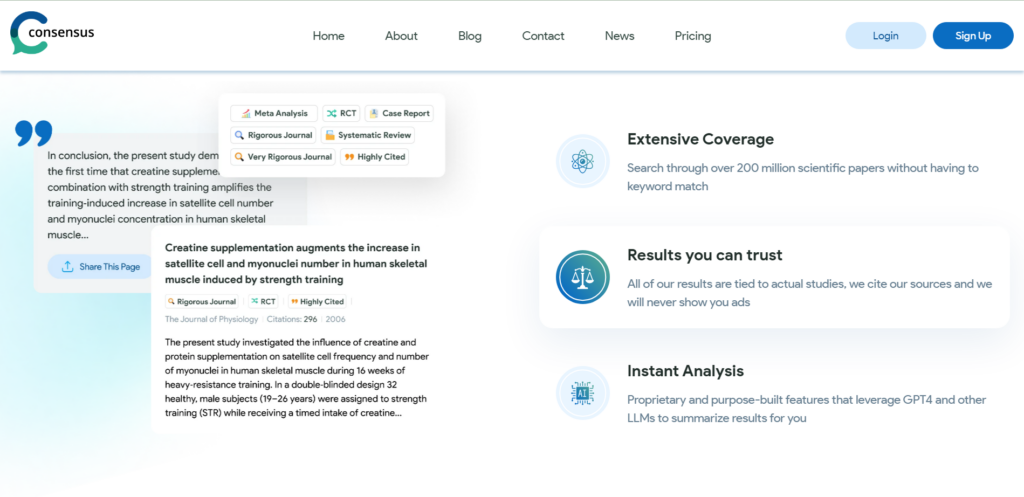
Consensus is useful for everyone and invaluable for researchers. It is an AI-powered search engine that takes questions in natural language and finds evidence-based answers from peer-reviewed research papers. Let that sink in.
While Google invests a lot in understanding the intent behind a search and providing the best answer, as a researcher you know how frustrating Google searches can be. You have to wade through an ocean of unverified content to reach evidence-based answers unless you are a master of keyword matching.
- Consensus helps you access information spread across 200 million peer-reviewed papers.
- They’ll cite the sources while answering your questions.
- Every answer is evidence-based
- The tool offers instant summaries and analyses with the help of GPT 4 and other powerful LLM
When it comes to using AI to augment research work, this is the real deal. You can use Consensus for research without paying a dime. The free edition will even let you create 3 summaries a month. For a price of $7.99 per month, you can generate unlimited summaries powered by GPT4.
3. Scite
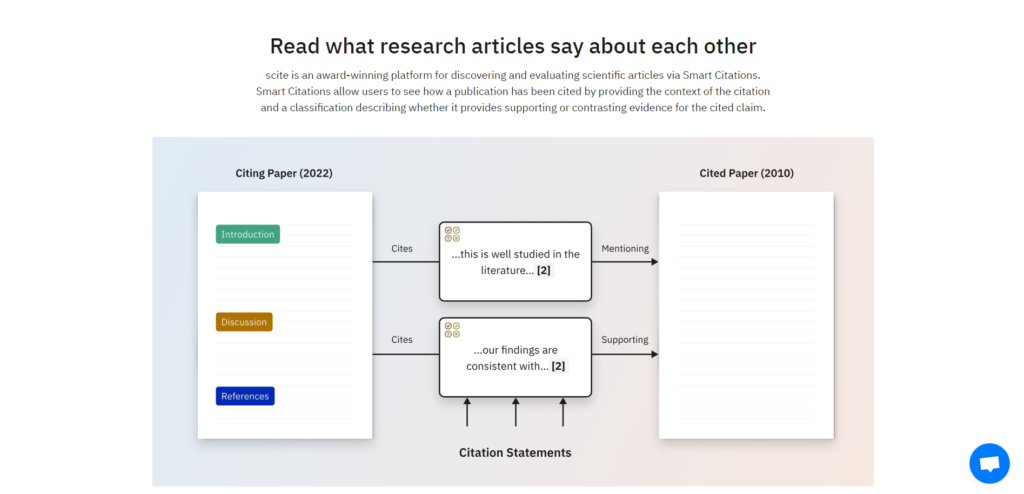
Scite, just like Consensus and PDFgear, has a very simple but elegant offering for researchers, students, and scholars. It tells you where an article has been cited and whether the citing article affirms or disputes the citation. So, as a researcher and a smart individual, you already know why this is incredible. I’ll talk about it a little anyway.
Scite helps you find how older research publications have been cited by newer research work through a feature called Smart Citation. This feature allows you to visualize a network of citations stemming from a single piece of work. It identifies the context of the citation and also classifies the citations as affirmative or negative.
You can take a glance at the visualization and instantly prioritize the publications that you want to go through. Scite is a real stress buster that can also open your eyes to new research angles.
These really are exciting times for researchers.
4. SciSpace
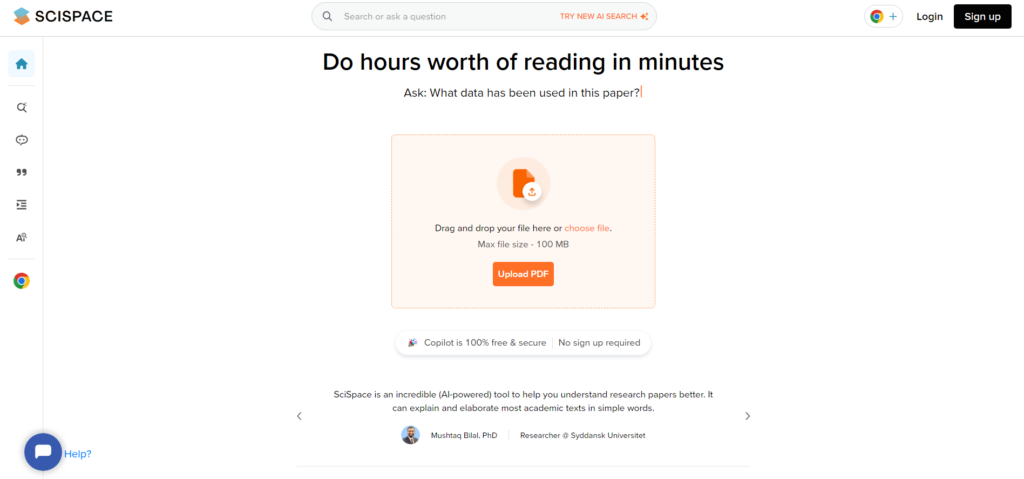
SciSpace is an AI-based tool that simplifies difficult concepts for you. So, if you are in a hurry and need to extract the gist of a sizable scientific paper, drop it at SciSpace and let the Copilot create a summary for you.
What if you have read an entire paper and cannot make sense of a specific section? Upload the file at SciSpace and highlight the section you need help with. The tool will break it down into digestible chunks and even take follow-up questions from you.
SciSpace also helps you with your literature reviews by finding related articles.
5. Wordvice AI
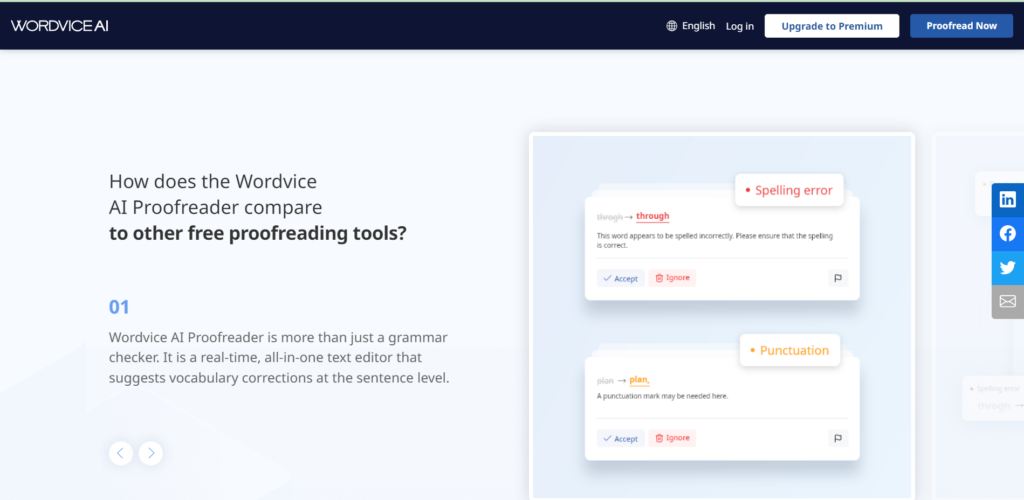
Wordvice AI is a well-rounded AI-powered writing assistant. It proofreads your work and checks your articles for spelling, punctuation, and style error. It helps you maintain a flow of writing by analyzing sentence structures and offering sentence-level suggestions.
It will help you choose better words and create better sentences, all while ensuring the correctness of spelling, grammar, and style.
Wordvice has solid use cases in academic research as well as in the corporate sector. It will help marketers write better copy and sales executives compose better emails.
If you look closely, most of the AI tools for research can actually be repurposed for other functionalities. Similarly, AI apps meant for business can be repurposed for research.
6. ChatGPT
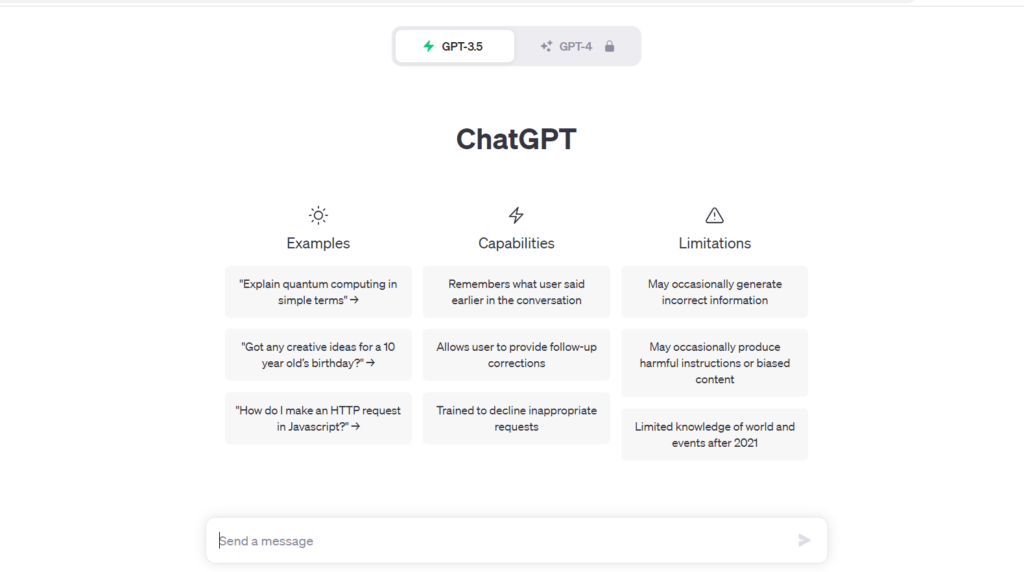
ChatGPT is the OG generative AI chatbot. It took the world by storm and reached 1 million users in 5 days. It represents everything that’s cool about chatbots. But can you use it reliably for research?
The answer is no. ChatGPT is not considered a credible source for conducting research in any field. It comes up with false citations, offers misinformation, and isn’t up-to-date.
Then why is ChatGPT included in this list?
For two reasons:
- It is excellent at taking scattered information and forming comprehensive summaries.
- Its capability to adapt to a certain style of writing is almost magical.
So, as a smart individual what you can do is, get the information from credible sources, tie them up neatly with multiple prompts, and use ChatGPT to transform information into literature.
Also read: ChatGPT Wrappers: Compared [Use ChatGPT for Almost Free]
7. Research Rabbit
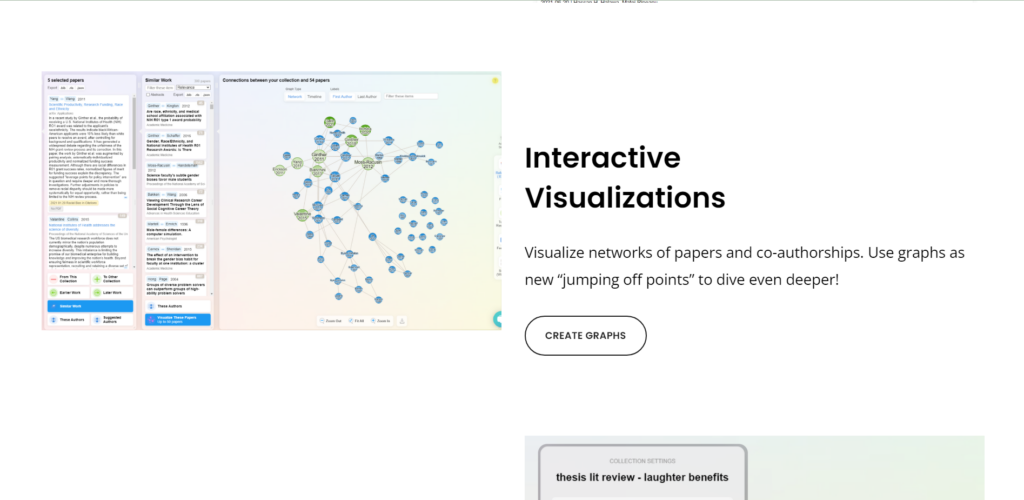
They call it “Spotify for Papers” and there is good reason behind it. ResearchRabbit allows you to create a collection of papers much like a Spotify playlist. Then, based on what you add to your collection and how you interact with papers, the platform creates recommendations. How neat is that? It’s like the AI-powered tool is reading your mind to help you read better.
Paper recommendations aside, ResearchRabbit also creates visualizations featuring your favorite articles showing how they’re cited. It gives you jumping-off points to delve deeper into an idea or to explore a different research angle.
You cannot call Research Rabbit a research assistant in its traditional sense. It is more like a friend that nudges you to try something new – relevant papers in this case.
8. Bit.ai
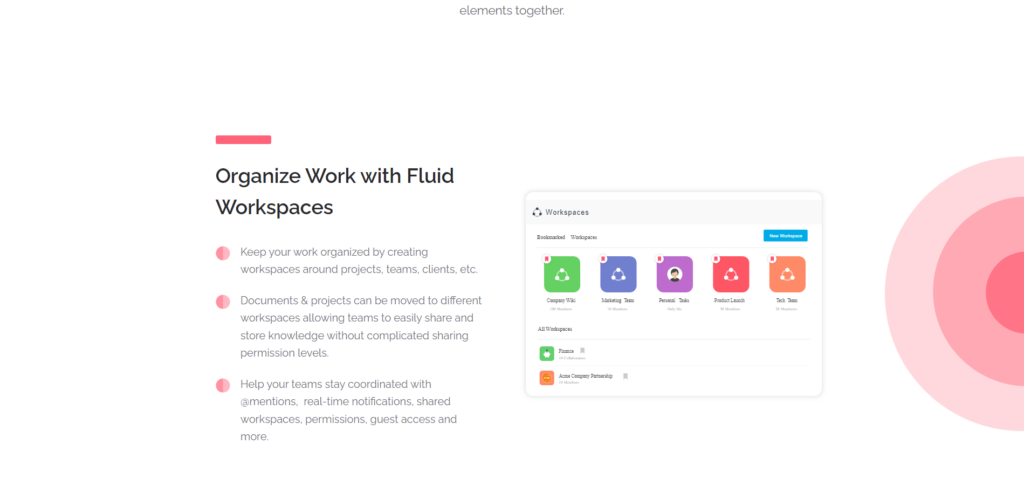
Here is another tool that’s never been marketed as an AI tool for researchers. In fact, Bit.ai is a fully-fledged document-sharing tool designed to cater to corporate needs. Nevertheless, it has certain features that researchers who like to collaborate can leverage.
This tool allows you to integrate a vast range of media items with your document. You can add infographics, create polls, and insert charts, and surveys. When you embed a link, Bit creates interactive visual cards visible to everyone sharing a document.
You can save all kinds of digital assets on the platform so that you do not have to search for content from different sources.
Now, imagine a scenario where you are part of a team of researchers who are collaborating on a few papers. You can organize and orchestrate the entire collaborative process with the help of Bit.ai.
9. Zotero
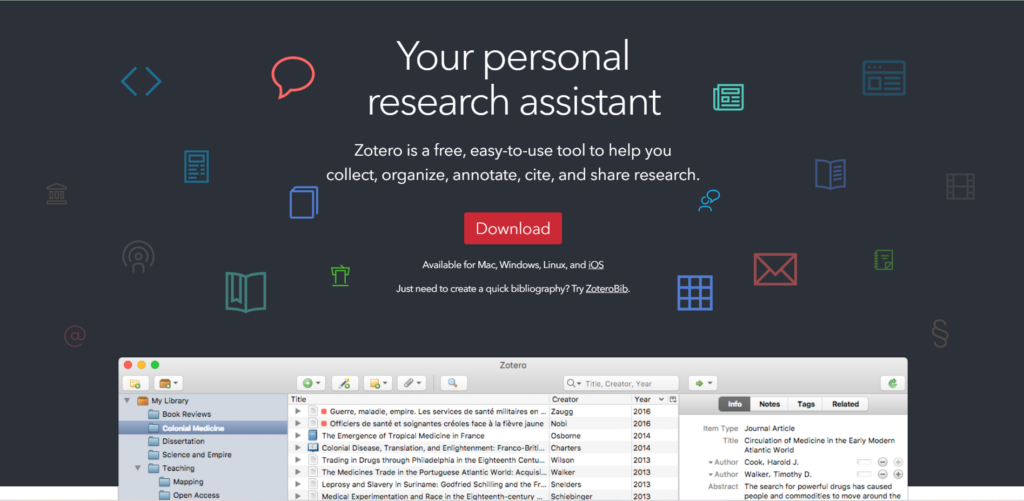
Zotero is a well-rounded AI research assistant. It helps researchers search better, organize better, and write better. Zotero analyzes your browsing patterns and senses when you are doing research. It then helps you find, sort, and save specific articles.
As you write the AI model recognizes the sources you are referencing and cites them for you following any of the 10000 citing procedures that it supports.
It creates a bibliography of all the resources used in your research paper. It synchronizes your data across devices to ensure access from anywhere at any time.
10. Semantic Scholar
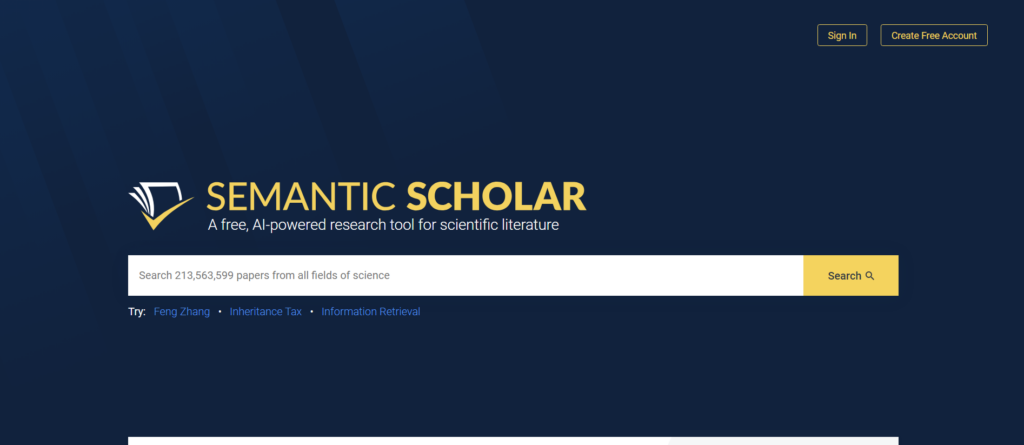
A search engine that helps you search from a database of 213 million scientific papers for free. It is somewhat similar to Consensus except for the fact that it is completely free. The platform is developed by Allen Institute for AI and it aims to make scientific literature accessible to all scholars.
As a researcher,
You can use Semantic Scholar to stay up-to-date with the latest scientific breakthroughs
Extract meaning and identify connections within papers
Find the highly influential citations at a glance
Create an online library to organize all your material
Get paper recommendations
AI tools for researchers that didn’t make the list
Elicit
An AI research assistant that helps you find papers, extract meaning, and summarize articles.
Trinka
A sentence structure checker and proofreader designed with scholastic compositions in mind.
ChatPDF
Users can use this tool to converse with PDFs. They can get summaries, ask questions, and find insights into PDF files by uploading them.
iThenticate
A plagiarism-checker designed specifically for research works and scholastic literature.
Scholarcy
Scholarcy is a platform driven by AI that helps you analyze scientific articles, extract key information, create lay summaries, and more.
Maintaining academic integrity while using AI tools for research
While using AI-powered research tools is hardly a matter of choice anymore, it is important to maintain the ethics and standards we associate with academic research. Despite the use of cutting-edge AI, your research procedures should be transparent.
Best practices for AI-powered academic research
- Mention the use of AI in your research and give credit to the developers.
- Discuss your use of AI tools and how their usage may have impacted the research outcome.
- Make sure that AI tools are used adhering to data privacy and informed consent requirements.
- Do not use AI-generated content in your research work without due attribution.
- Subject AI-assisted work to rigorous peer review.
FAQs about best AI tools for researchers
Does using AI tools for research raise any ethical concerns?
Yes, there can be concerns regarding data privacy, biased outcome, attribution of credit, and plagiarism. Researchers must be mindful of these issues while involving AI in their research strategy.
Can AI research assistants be used with AI expertise?
Most AI research assistants come with a conversational AI model that doesn’t require any expertise to use.
Is there an AI-based tool for historical research?
You can use general-purpose AI text analyzers to summarize large volumes of historical texts and create summaries. While there are AI-powered applications trained on historical data, they are mostly gamified, and cannot be directly used in historical research.


